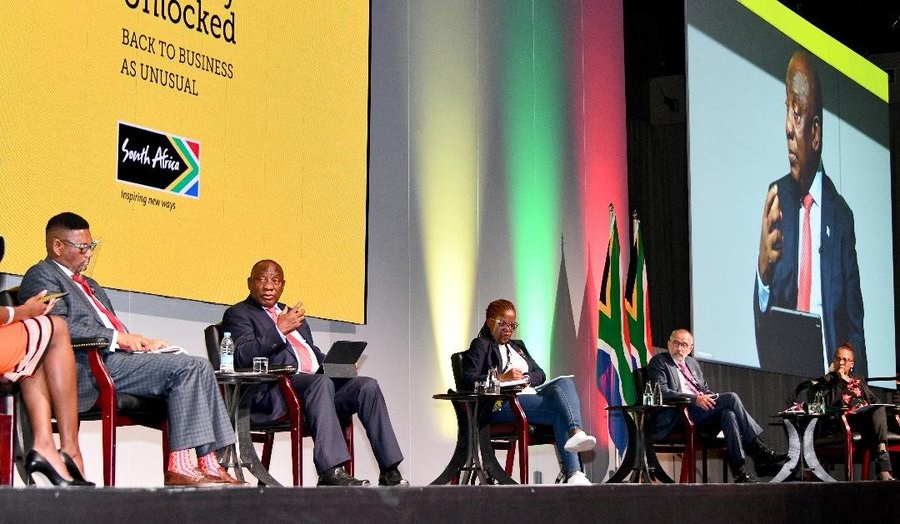
South Africa’s Audacious Drive to Attract R1.2-Trillian is Beginning to Bear Fruit
What started as an audacious drive to attract over R1.2 trillion in investment over five years into the South African economy is beginning to bear fruit 25 months into the journey. Over the past two years, investment pledges made at the first two instalments of the South Africa Investment Conference are steadily coming to fruition. […]

What started as an audacious drive to attract over R1.2 trillion in investment over five years into the South African economy is beginning to bear fruit 25 months into the journey.
Over the past two years, investment pledges made at the first two instalments of the South Africa Investment Conference are steadily coming to fruition.
On the second day of the third annual investment conference, conglomerates Naspers, Amazon, Anglo American and Procter & Gamble illustrated how they made good on their commitments and continue to do so, despite the unravelling COVID-19 pandemic.
Naspers chief executive, Phuti Mahanyele-Dabengwa, on Wednesday, said the company had followed through on its R4.6 billion investment commitment.
“When the President was looking for investors, we said we would make capital available,” Mahanyele-Dabengwa said.
In 2019, when the commitments were made, Naspers had already invested in a stake in technological start-up, Sweep South. At the time, the company was hiring 15 000 people. The number has now grown to 20 000, Mahanyele-Dabengwa said.
Naspers has invested R1.4 billion in Foundry, a South Africa-focused start-up funding initiative that helps talented and ambitious South African technology entrepreneurs develop businesses.
“The reality is that throughout this pandemic, [Sweep South] had no revenue but continued to pay employees. And this is this commitment we found from founders,” said Mahanyele-Dabengwa.
Over the past year, the multinational has also invested in start-ups Aerobotics, FSM, as well as StudentHub. About R2.3 billion of the commitment was directed to extending Naspers operations in South Africa.
This, Mahanyele-Dabengwa said, shows the commitment to growing not just companies the size of Naspers but also small businesses that are looking to make a difference in the lives of South Africans.
Naspers, she said, financed companies started by founders who come from top global universities, who “don’t have to be here but chose to be here as South Africans”.
“If you look at Aerobotics, 50% of their revenue is from the US, and Sweep South has expanded to Kenya. These are founders of businesses that are growing. Their businesses are growing beyond [SA borders],” she said.
Fulfilling commitments
Also making good on its investment commitment is United States technology multinational, Amazon Web Services (AWS).
During the 2019 leg of the conference, Amazon pledged to build its first cloud data centre in Africa, in Cape Town. The commitment came to fruition when the centre was open earlier this year.
Speaking at the conference, Director & Teleco Lead for AWS South Africa, Prabashni Naidoo, said: “We are proud and honoured to be part of the transformation.
“Tyme Bank is using our services to support customers.”
With small businesses seen as drivers of economic growth for South Africa and Africa, AWS is “uniquely positioned to help them access infrastructure that was previously only accessible to enterprises globally”.
“There’s no start-up cost. They are able to access information, experiment and innovate,” said Naidoo.
On the job creation front, the AWS investment in June came with 3 000 permanent jobs.
Anglo American chairperson, Nolitha Fakude, said the company has made good on its R87 billion pledge because it still believes in South Africa and what it has to offer. The company has already invested R57 billion of the committed total.
“We’ve always seen mining as a catalyst for economic development in SA because the resources the country has are quite extensive.
“As a company that has been operating here for more than 100 years, we know of the huge opportunities that are here, should stakeholders work together to realise them.”
Anglo American, she said, also realises that some minerals are still in abundance in the country.
“About 70% of platinum globally comes from South Africa, so for us as an organisation that has been working across various commodities, we know that the opportunities are quite huge because we have a portfolio of assets that range between 10 to 60 years,” she said.
Fakude said because Anglo American conceded that mineral resources are finite, the company was starting to consider its sustainability.
“Therefore technology innovation is part of the future.
“Our commitments going forward are based on the fact that we have a portfolio of solutions that we are putting in place to ensure mining operations are environmentally friendly for water and energy. Looking at the hydrogen economy and platinum, they form an important part.”
Vilo Trska, Procter and Gamble general manager for South Africa, said the company had in the last year produced on the R300 million pledge made in 2018 for the production of Always sanitary pads.
Despite the COVID-19 pandemic, Procter & Gamble was forging ahead with investing R260 million in improving its production capabilities and plant facilities to drive up local supply for local demand. – SAnews.gov.za
